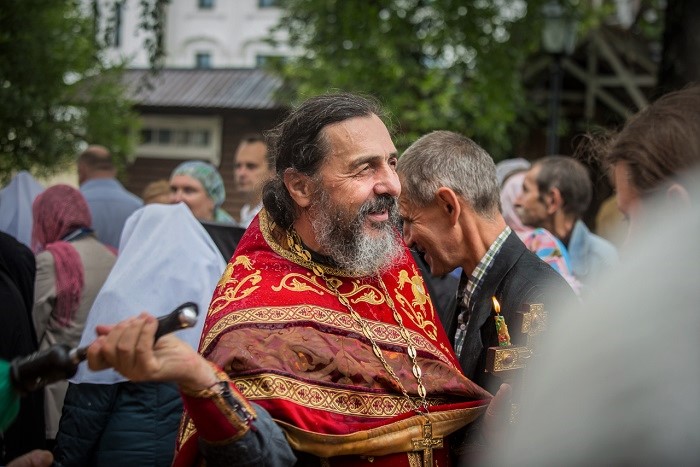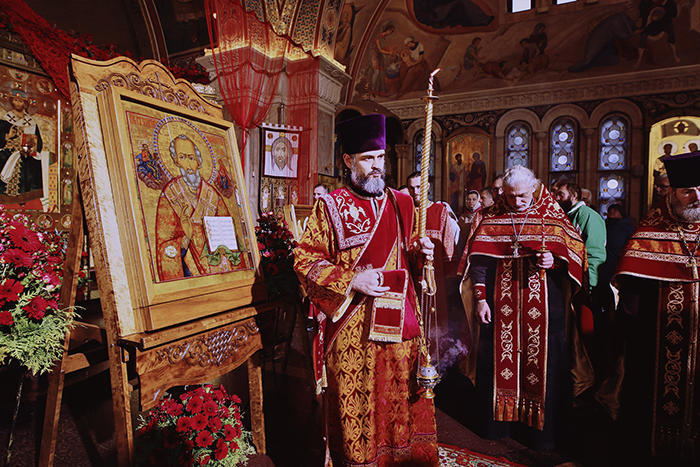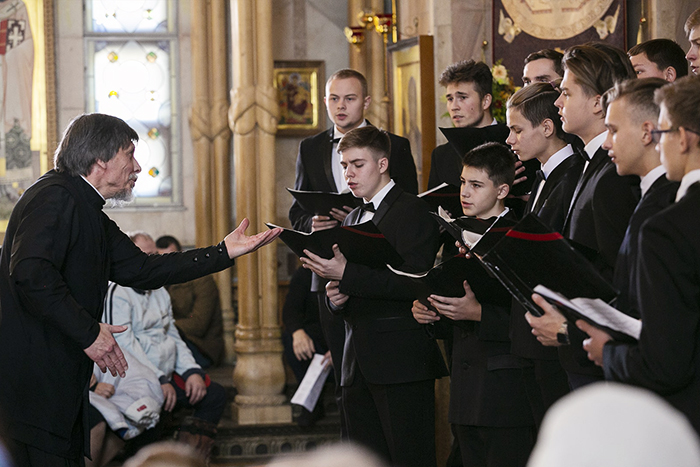
Steven Lacey is special in many ways. An Orthodox Englishman, a good friend, a man blessed by many virtues and a frequent guest here, at St Elisabeth Convent, Steven lives near Southampton, a place by the seaside just outside of London. During his last visit we did several interviews with Steven. We have put together some of the stories, thoughts and ideas that he shared with us into a kind of a monologue, that we are now offering you.
ACQUAINTANCE WITH RUSSIA
I first went to Russia on a school trip in 1989. It was the time of Perestroika, the fall of the Iron Curtain. The first McDonald’s had just opened and there were still hard currency shops. To me it was also the time, when I fell in love with Russian people and the beauty of the Russian soul. This love has remained with me through some of my darkest years until this day.
From there I got a big interest in Russian history and culture. It differs from the Western culture and it has a deeper meaning at its heart. I have read much about Russian history. I especially enjoyed reading about Ivan the Third and the Russian Royal family and later I discovered wonderful Russian authors like Dostoevsky, that touched my soul like nothing had ever done before. The deep understanding of sacrifice and redemption is what I love most about Russian culture.
I think it is no coincidence that Russia helped me discover Christ.
PROFESSION
I have my own company doing culture studies and qualitative market research i.e focus groups. I specialize in several different areas, one of which is focused on understanding culture globally. For example, I have projects dedicated to understanding Russian women or the way that the concept of “frenchness” is perceived by British people. Such work is needed for building marketing strategies for certain brands, and before I started my own business I had been doing this for Samsung Galaxy 8 in a major advertising agency. It is one of the most successful agencies in the UK, working with brands like Mars, Coca-Cola, Ikea etc. I am one of the leading specialists in England doing ethnographic research and face-to-face interviews of so-called hard-to-reach audiences. It is often necessary for the government or charities to understand the behaviour of groups like sexually abused children, prisoners, drug-dealers, football hooligans. Recently I have been doing a research with crack, cocaine and heroine users and also alcoholics. Some of the conclusions that I have made have to do with connections between drug use and mental health, especially in cases involving the loss of a close relative, when people tend to despair and can take substances far more dangerously . I also work quite closely with disabled people.

DISABILITY
I take personal interest in the topic, as I have a disability. I have what they call a Lobster Hand, a missing Fibula bone in one leg and a shortening of Tibia bone on the other. I have two toes on one foot, four on the other and I am wearing these plastic aids on my ankles. When I was born, the doctor said that I would not walk, but my mom would leave me on the floor and start leaving. This is how she taught me to get up, walk by myself and do many things in life.
I played rugby and was the first to jump off the highest board at a swimming class. I did martial arts, and they put me in a martial arts magazine. I was once captain of a football team. We lost 21:0, but that is not the point. While studying at West London university I was elected President of Student union. I led the first student union strike, with over a thousand people protesting in the street. My mom helped me develop the kind of attitude that made it possible for me to do much more than just walk. She has always been a very strong bedrock in my life, she died of cancer in three months when I was 29. Her death struck me deeply, and I started drinking. For years my life was put in darkness.
BAPTISM
For many years I have been deliberately destroying my soul with harmful habits and “living the high life”. I still had deep love for Russia and would often go there on holiday, mostly interested in drinking and partying. I was 33 years old, when I woke up in St Petersburg one day with a bad hangover from the night before.
I went outside and saw Alexander Nevsky Monastery. I thought I would go and have a look at what was happening there. I entered and found myself in the middle of a Liturgy. What I felt can be best described as God’s presence. I was crying as I was watching the Liturgy. I often thought about that moment later, as I was reading about St Vladimir’s conversion to Christianity. Just like Prince Vladimir, I thought that I was in heaven at that moment. I felt that my mother was close to me and I also felt that I needed to change my life. I walked in there a non-believer and I walked out believing in God. My soul was captured instantly at the right time, and I feel very blessed because after that God helped change my life and move in a different direction.
When I was born, my grandma and my mom went to a protestant church, but they did not want to baptize me, because they wanted it to be my choice. So I was baptized into Orthodoxy in Metropolitan Anthony’s church in London. I have never met Metropolitan Anthony of Sourozh, because he died two years before I started going to church. But from his books and the people that knew him well I see that he was a true apostle of the Orthodox faith in the West and also a true apostle of love. Every word that he writes is a witness of Christ and a lesson of having Him within our heart and also seeing others as icons of Christ. I think that being a parishioner of two Russian churches in London has given me understanding of many different types of émigrés that came to the UK after the October revolution and the suffering that these people have been through. I often think about how blessed today’s generations are. Despite the problems that exist today, we are spared from war, starvation, exile, these truly disastrous phenomena described by Metropolitan Anthony and Bishop Nikodim of the Russian Church Abroad. As I joined the orthodox community I have taken upon voluntary work beautifying orthodox graves at the Cathedral cemetery. Metropolitan Anthony’s grave is always well looked after, but about a hundred others, including graves of high nobility are in decay. Every year or twice a year together with a group of volunteers we go and tidy them up to make sure that they look beautiful. We also have a list of all the names and include them in our prayers.
KEEPING THE FAITH
Having a disability myself, I have some understanding of human suffering and I would like to be helping people deal with it. I have got bored of doing marketing just to sell soap boxes (smiles). One of my recent projects focused on attitude towards disability in Russian, Chinese, American and British societies. The situation is the worst in China, where it is considered ‘bad luck’ even if a disabled person touches you. In some forms of Buddhism, in its own terms, a disabled person’s karma is lower then a transsexual’s. Generally speaking, the two major associations with disability shared by all nations are the feelings of pity and shame. People feel sorry for a disabled person and also ashamed. Both reactions sadden me as an orthodox christian although I quite like the fact (laughs) that because of my disability I seem to be enjoying almost as much love and attention of the babushkas in Russian churches as the priests do.
I often participate in conferences, talk to company boards and people in marketing industry about disability. With the increase of human life span, the percentage of people facing disability will also increase. I would like to do more about it and often think about the orthodox view of disability being a cross that we are carrying rather than something to be sorry about or ashamed of.
I also think that by limiting our physical abilities God gives us a chance to explore our hidden potential, our spiritual side. He gives us all gifts, and we need to understand the gifts that we have. I recently read a short story about a bedridden woman who was unable to move, but all her senses were elevated, and her inner world was beautiful. This is something that I would like to be sharing with people, particularly with children.
I think it is important for people facing disability to have strength and self-belief and not to rely on pity. I think that whether or not we consider it a metaphor, we are all disabled in many ways. There are many stages in life, and we have to ride the ups and downs. If we accept disability as a cross, we can either leave it where it is and complain about how heavy it is or we can try and hold it up high.
We are all God’s images, and there were many saints with disabilities. St Valentina of Minsk is a wonderful example of that.
FOLLOWING THE SAINTS
I often address St Elisabeth in my prayers. Her life is an extraordinary example of witnessing to God, an amazing journey showing how Western culture and Orthodox faith can come together to form a beautiful image reminding us of God’s love. Not only did she suffer for Christ. She entirely dedicated it to helping people and reducing human suffering. Indeed, St Elisabeth was out there helping people until the very moment of her martyrdom.
We can read spiritual books and enjoy going to church services, but to me it is more important to live and breathe our faith as much as we can. We can only do it by showing love to our fellow men and women. I know little about theology, but a wise priest once said to me that we will be judged not as much by what we have done for others, as by what we have not. To me it means that we, as christians, should often think about what more we can do for people around us. The world is soft now in the sense that there is no war or famine. But there is also no sacrifice. We have become obsessed with the “I” and tend to forget about the “we”.

My baptism name is Stephen, after St Stephen, the Martyr. I feel strong relationship with St Stephen and martyrs in general. I see a trace of martyrdom in the way that disabled people are often judged in a negative way by the society today. This especially concerns the way modern societies judge the ability of disabled people to have families or personal relationships. But if societies looked at disability being a cross that we are carrying rather than something to be sorry about or ashamed of, they could become more supportive towards disabled people and provide the help needed to allow them to use their gifts for the world. God cares for his people. I think that we should love one another for who we are as a soul and help each other find and use that talent that God has provided us with.
This is what I like about your community. You do not focus on pity as much, but you lift people up and help those that are struggling
IMPRESSIONS OF ST ELISABETH CONVENT
I am very impressed and deeply touched by everything that you do here, at St Elisabeth Convent and also when you come to the West and act as apostles introducing people to Orthodoxy. Rather than chasing people in the street and starting conversations about the Bible, as Evangelical protestants do, you organize concerts and festivals, participate in markets and educate people through beautiful things like music or crafts. We are living in a very fast world. We seem to only be concerned about ourselves and ignore our neighbours. We are on the internet, constantly looking at screens. All of it makes us feel lost. Not knowing who we are, we are losing our sense of identity. Because of that we are also losing kindness. We just aren’t very kind to others any more.
Through God’s grace your convent is an example of just the opposite. Being a very open community, you give people your attention, and the time that you devote to others is a token of kindness. It certainly is a miracle how much you have done in such a short time. You are paying much attention to detail. I can see it in the way everything looks here, the mosaics, the artwork, all these beautiful objects. But I also see that you are giving most attention to people’s souls. It is in the way, Father Andrey gives his talks, and how other priests bless people with water. They do it individually, one by one, and also very slowly. When people ask a question, the nuns take them aside and have long conversations, giving these people all the attention that they need. I call this “the gift of time”.
When I was in the Royal Martyrs church, I saw a beautiful mosaic of an anchor in the baptismal pool. I thought it was a beautiful symbol of what your community does, acting as an anchor in people’s lives. In these hard times everybody needs a place to return to. But besides that, your community gives people the freedom to lift the anchor and set sail into the world. Being God’s children, we sometimes make two steps forward and fall over, just like children do. But the work that this community does to help people stand back up on their feet is yet another God’s miracle.

GOING THROUGH CHANGES
To me being orthodox is rather a path than some permanent state that we enter in life. I think that I am truly orthodox only in the moment of taking Holy Communion. To stay orthodox one needs to fly straight. But we are never quite there, as it is human nature, to fall over. But on this journey into Orthodoxy I am starting to learn to love other people and have joy within myself.
Orthodoxy has changed my life in many ways. Intellectually it has opened a new world to be explored. It allowed me to discover new books, new authors, new cultures, like Byzantine, Georgian or Moldovan. Very few people in the west have heard of them. I study history and read spiritual books. Another change that is important to me is how Orthodoxy has given me many new experiences. It has allowed me to go to places like Moscow, St Petersburg, Pochaev, Novgorod and, of course, Belarus, that I love very much. I have recently visited Pühtitsa Convent in Estonia, Bari and I regularly visit
Mount Athos. Visiting each of these places is a blessing, a new experience and a chance to learn something. Each of them holds a place in my heart, but it is difficult for me to choose one that stands out among others. It might be Mount Athos, as it is very special for my soul. I have been there eight times, visiting different monasteries. I can say that all of them differ in the way they serve God. The feeling that I get from visiting each community is also unique. Sometimes it is the strength and power that I sense, sometimes it is love and tranquility.
The biggest change that I have undergone being an Orthodox christian was in the heart. I think that I am learning not to be selfish. It would be no exaggeration to say that Orthodoxy has saved my life. Metaphorically speaking, I was ready to drive off a big cliff with it. My addictions and my attitude in general would have got me dead on in prison long before I had a chance to realize it. Orthodoxy has changed everything by helping me understand who I am as a person. It has opened to me that everything is from God, that my disability was not only a cross but also a blessing, an important factor that shaped my personality and helped me travel to different countries, make wonderful friends and discover true Faith. Orthodoxy has allowed me to accept who I am and be happy and thankful to God for the beauty that surrounds me and the blessings that I have received.
BEAUTY
I think that we need to be true to ourselves, smile and thank God. It will help us see beauty in one another. Beauty is often perceived as the way someone looks externally, and you can see much of it on the internet, especially in dating industry. Dating sites resemble shopping lists, where people are checking off parameters. We want someone 6’2, with long hair, blue eyes… drives a BMW… has a PhD… can speak Greek and has lived in South Africa. As a result people get trophies instead of soulmates. But trophies soon become boring. I think that what we should really be asking ourselves when looking at a person is ‘What can I do for that person?’ ‘How can I love that person?’ And through that love and through the Grace of God, love will be returned to us.




I had the pleasure of meeting Steven last week in a Russian church in Southampton. He’s a great man with an amazing story to tell. A lot to learn from him.